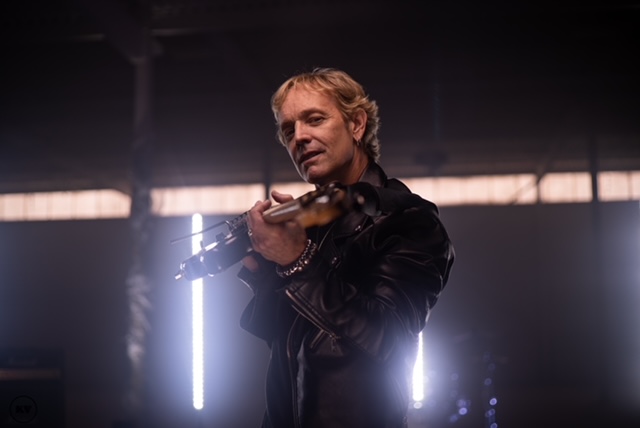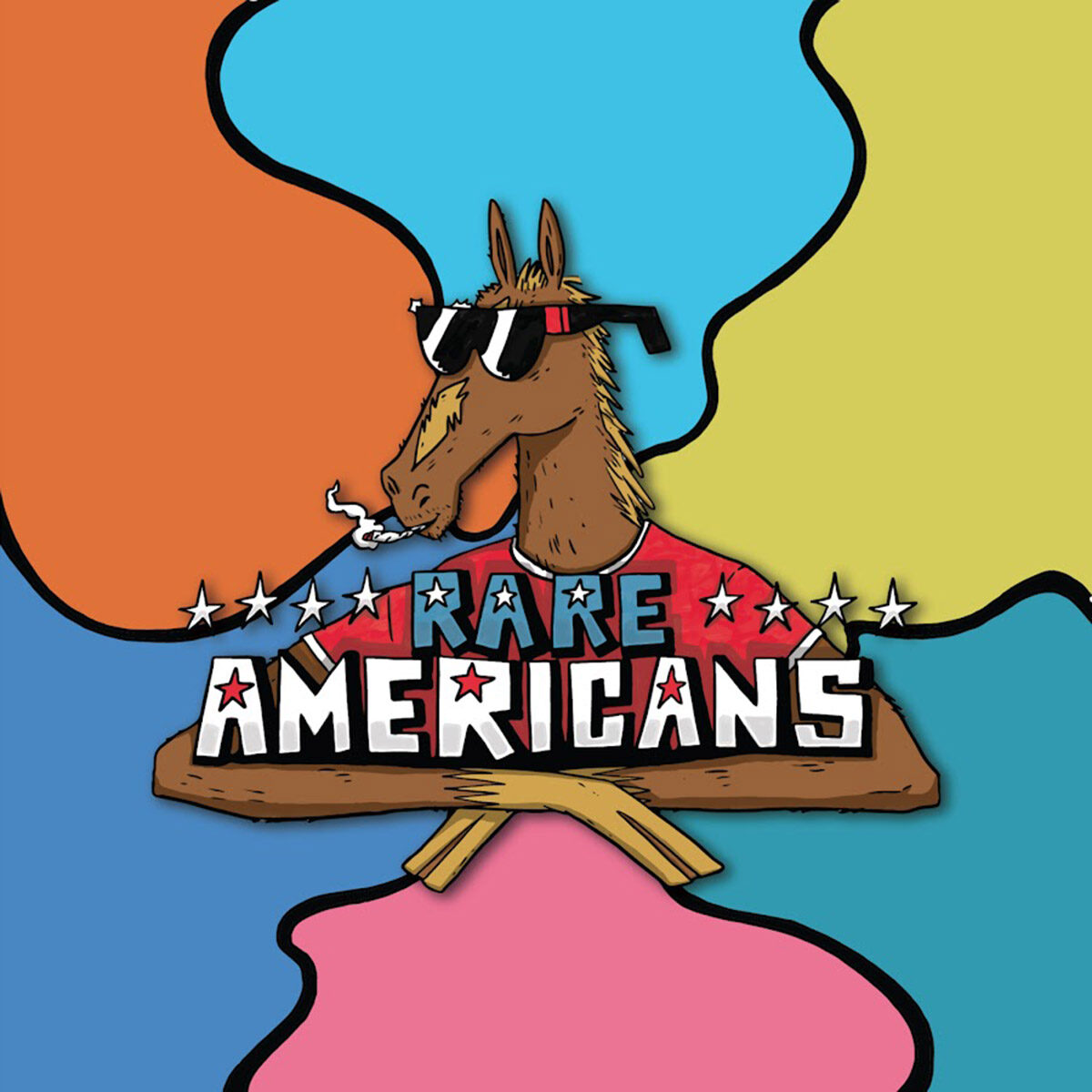This Beat Goes On/Switchin To Glide, Anatomy Of A One-Hit Wonder- That title says it all.
The Kings’ 2009 documentary produced, written and directed by the band’s guitarist Mr. Zero (a/k/a John Picard) honestly summarizes this Oakville Ontario’s giddy rise to the top of the U.S Billboard and radio charts in 1980 on the strength of their debut album, “The Kings Are Here” on Elektra Records and their equally rapid decline following the less than successful release of their follow-up “Amazon Beach” in 1981. Yet in the immortal words of Monty Python “Not dead yet”
Mid June and the Kings, now comprised of band originals Mr. Zero, Dave Diamond (a/k/a Dave Broadbent), drummer Todd Reynolds and keyboardist Peter Nunn (who splits time with Honeymoon Suite) are on stage at Burlington Ontario’s Sound Of Music festival, splitting time with the likes of fellow survivors The Spoons, Grapes Of Wrath and Honeymoon Suite.
“Yes it was alright, for a free concert,” reports Mr. Zero, calling in to give Music Express a career update. “We sounded good, we did our thing and we were on a pretty decent bill.” Mr. Zero admits he would like the Kings to be more active but admits the band doesn’t currently have a manager or a booking agent; most of the band’s current activities are stimulated by him. “We are talking to Bernie Aubin (Canadian Classic Rock’s agency owner – and still drummer for The Headpins). He does a lot of casino gigs out West that would be ideal for us. Tour us with another classic rock band; Prism, Streetheart, somebody like that.”
[youtube width=”600″ height=”450″ video_id=”sxkjvKBPQjo”]
Mr. Zero’s primary objective right now is to make sure the band’s The Kings Are Here website is totally in order. The band has bought back all its own publishing from Elektra, markets all their own albums, CD’s and DVD’s under their own Dizzy Records label, on their own site, including Lost Tapes Of A Seventies Bar Band, recorded when they were called Whistleking, along with the band’s distinctively branded t-shirt and has finally managed to get their classic This Beat Goes On/Switchin To Glide opus available on iTunes. “Right now, it’s all about gathering together our history. It took us three years to get our publishing back and it’s been a 10-year battle to get This Beat Goes On/Switchin To Glide available on iTunes but better late than never. We are really concerned about the quality of stuff out there; we don’t want to misrepresent ourselves. If anyone posts a video of us on YouTube and we don’t like it – I contact them and politely ask them to pull it. If they refuse then I get the YouTube Police on them.
Diamond and Mr. Zero are still creatively active and continue to drop new material into their sets, “but lots of times it’s songs that we’ve stumbled across on old tapes rather composing new stuff so we end up resurrecting these tracks” admitted Zero. “It takes just as much effort to write a shitty song as it does to write a good one and we were never the most prolific of bands, cranking out songs every half an hour.
Still all Zero has to do is to tune into any oldies radio station at any time of the day and he’s bound to catch that throbbing guitar riff that launches `This Beat Goes On-Switchin To Glide’ which over the years has become a rock music classic throughout North America.
Photography by: Ted Van Boort
The year was 1979; Dave Diamond, Mr. Zero, keyboardist Sonny Keyes and drummer Max Styles had gone into Toronto’s Nimbus 9 studios to record their debut album. As Whistleking, they had won a radio contest on CHUM-FM but no local record companies had shown any interested so they decided to go it alone. That’s when producer Bob Ezrin entered the picture. Fresh from producing Pink Floyd’s The Wall album, Ezrin was on a bus man’s holiday back in Toronto and dropped by Nimbus 9 to visit old friends when he ran into The Kings stumbling through their debut sessions. “Bob liked what he heard and initially offered to mix the tapes for us,” explained Zero. “He took the tapes home, his kids apparently liked the songs but he realized that the tapes needed to be remixed so he agreed to take on the entire project,” enthused Zero. “We were students at the feet of the master, learning how to record our first album,” noted Zero. “I mean here we are with the biggest producer in the world, someone everyone is fighting to get to record their records, yet he chose to work with us. I think it’s because we were such a refreshing change from Pink Floyd – we were this young pop band who was willing to learn and Bob liked the idea of being our teacher.”
And it was Ezrin who took The Kings’ tapes to Elektra in Los Angles and convinced A&R chief Ken Buttice to sign the band directly to the States. “Bob was playing `This Beat Goes On’ and `Switchin To Glide’ in Baptiste’s office and they looked out the window and there were kids outside listening to the tracks and dancing on the street.”
Contrary to popular belief, it wasn’t Ezrin who decided to segue `This Beat Goes On’ into `Switchin To Glide’, “Dave had already done that before Bob entered the picture, but initially Elektra was reluctant to run them together, they thought it was too long for radio. They initially just released Switchin To Glide but the jocks decided themselves., “Hey, if we can play `Bohemian Rhapsody’ by Queen, why can’t we run the two Kings’ tracks together.
[youtube width=”600″ height=”450″ video_id=”YH3r4md8abE”]
With their debut single exploding at radio, “The Kings Are Here” shaped up to be a massive release. Exposure on Dick Clark’s American Bandstand proved to be pivotal and gained them access to literally millions of fans, allowing the band to tour the U.S and even headlined Heat Wave Festival at Mosport Racetrack August 23rd 1980 on a bill with Elvis Costello, B 52’s and The Pretenders. The Kings even found themselves in Los Angeles singing back-up vocals on Kiss’s The Elder album. Yet their success would be short lived.
“Signing with Elektra might have been a Cinderella story but there was negative feedback with Warner Canada,” allowed Zero. “We were always the bastard child up here. Warner Canada held our US signing against us. Their attitude was `Who do they think these guys are”.
Things started to go sour stateside when their second single off the debut `Don’t Let Him Know’ fell victim to the payola scandal,( as detailed in Fredric Dannen’s `Hit Men’ book) that rocked the U.S record industry at that time. “Record companies were paying literally millions of dollars to independents to place songs on radio station playlists. Our first single slipped by them but we got hammered on our second single, and it wasn’t just us. Pink Floyd got nailed and even Loverboy got nailed. Record companies knew what they were doing and when you play that game, the price of admission is very high.”
[quote]“If it wasn’t for the incredible feedback we get from our fans, we probably would have packed it in long ago”[/quote]During this time, the Kings were sending demo tapes for a second album back to Bob Ezrin but they didn’t like what he was doing with them. “We applied what he taught us to those demos and we didn’t need his input as much. Yet that caused Bob to put more of his input into the demos – that didn’t help the situation to put it mildly” fumed Zero. “He thought he was doing his job to make the project better but it was a battlefield. He was the guy who brought us to the dance so we had to have faith in him – it turned out to be the wrong decision. When I listen to that record now I hear the ideas of what could have been but ultimately it wasn’t there.”
Coming at a time when hair bands became all the rage, Elektra dropped The Kings after Amazon Beach flopped both at retail and on the radio. Their U.S manager Randy Philips initially convinced the band he would find an alternative US deal, but when that didn’t happen, they retreated back to Canada where Canadian manager Gary Pring arranged to sign them domestically to Capitol Records Canada.
This only resulted in a Christmas EP titled RSVP in 1982 and that’s when things really started to fall apart. Drummer Max Styles left, keyboardist Sonny Keyes started to fade out of the picture, Diamond and Mr. Zero recorded “Unstoppable” with producer John Punter in 1993 but the bankruptcy of their U.S indie label, Griffin Music, disrupted distribution. An on-going problem was the Kings’ inability to release `This Beat Goes On and Switchin To Glide” on a CD – the song tied-up in litigation with Elektra. Mr. Zero’s persistence solved this problem when he convinced Alan Fletcher of Warner Music Canada to release a Kings Are Here repackage which contained additional tracks off their Unstoppable CD.
Mr. Zero and Diamond also released “Because Of You” in 2003 on Canadian indie Bullseye Records and with their Lost Tapes release and a new studio album in the works, Mr. Zero, Dave Diamond along with Peter Nunn and Todd Reynolds are determined to keep the Kings’ flag flying. “It’s not like we’re hockey players, we don’t have to pack it in when we’re 35 analysed Zero”
“If it wasn’t for the incredible feedback we get from our fans, we probably would have packed it in long ago,” he concluded. “The stories fans tell us are very gratifying. They tell us how much the band means to them and they encourage us to keep going – it makes you humble.”
















Comments are closed.